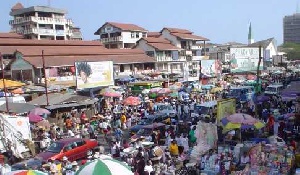The increase in the average cost of living for Ghanaians as measured by consumer price index inflation jumped to its highest in nearly four years in the month of December, driven by surging utility bills and transport costs which have been piling pressure on workers’ income.
Annual inflation rose from 13.2 percent in November to 13.5 percent last month, according to the Ghana Statistical Service. This means a basket of goods and services that cost GH¢100 in December 2012 would have cost GH¢113.20 last month. The inflation rate has not been higher since February 2010.
Utilities and housing costs, which rose by 35 percent year-on-year in December, have continued to rise in the New Year following hikes of 9.7 percent in the price of electricity and 6.8 percent for water at the start of January.
Compounding the squeeze on households, the prices of petrol, diesel, kerosene and cooking gas (liquefied petroleum gas) were increased from Thursday in a move by the National Petroleum Authority to match the retail prices of the fuels with the mounting cost of importation due to a higher international crude oil price and a weakening cedi.
Petrol jumped by 6 percent to GH¢2.33 per litre, diesel by 7 percent to GH¢2.42 per litre, liquefied petroleum gas by 9 percent to GH¢2.74 per kilogramme, and kerosene by 20 percent to GH¢2.42 per litre.
Analysts forecast last year that households’ living costs would soar in 2014 as universal energy subsidies were completely eliminated and the value added tax was increased from 15 percent to 17.5 percent.
The government has defended its belt-tightening policies, with President John Mahama likening his situation to a family-head who curtails his family’s bills in order to reduce debts of the household.
The tax hikes and removal of subsidies are therefore crucial elements of his plan to cut the budget deficit, which missed its 9 percent of GDP target in 2013, to 8.5 percent of output this year. The cost-of-living surge is however bad news for the government’s other strategy to curb the deficit -- that is, by keeping a lid on wages of public sector workers.
Speaking in an interview with the B&FT last week, Kofi Asamoah -- Secretary-General of the Trades Union Congress (TUC), the main representative of workers in public sector wage negotiations -- intimated that the union, far from accepting government’s proposal to freeze wages, will push for an increase above the official inflation rate.
“We don’t really see where this proposal for a freeze is coming from,” he said. “Even if the increase matches the projected inflation (the 9.5 percent rate forecast by the Central Bank), that will simply restore workers’ purchasing power. And we also have to consider that actual inflation could be higher than the projected, in which case we wouldn’t be able to come back and ask for a further increase. So the projected inflation is not the only factor as there are other cost-of-living elements.”
Rising inflation also puts the Bank of Ghana in an uncomfortable position as it will have to very soon decide whether an increase in interest rates is opportune, not only to contain the rise but shore-up the terribly weak cedi.
The currency, which plunged by 18 percent last year, has played a part in stoking inflation, with items that are typically imported seeing price rises much greater than the average. Clothing and footwear inflation was 16.6 percent last month, while furnishings and household equipment inflation was 15.7 percent.
Communication costs, comprising the price of mobile phone calls, also rose at an annual rate of 4.4 percent last month compared to 0.4 percent a year ago. Food prices were up 7.2 percent compared to December 2012, though the rate was lower than November’s figure of 7.3 percent.
Business News of Friday, 17 January 2014
Source: B&FT

















